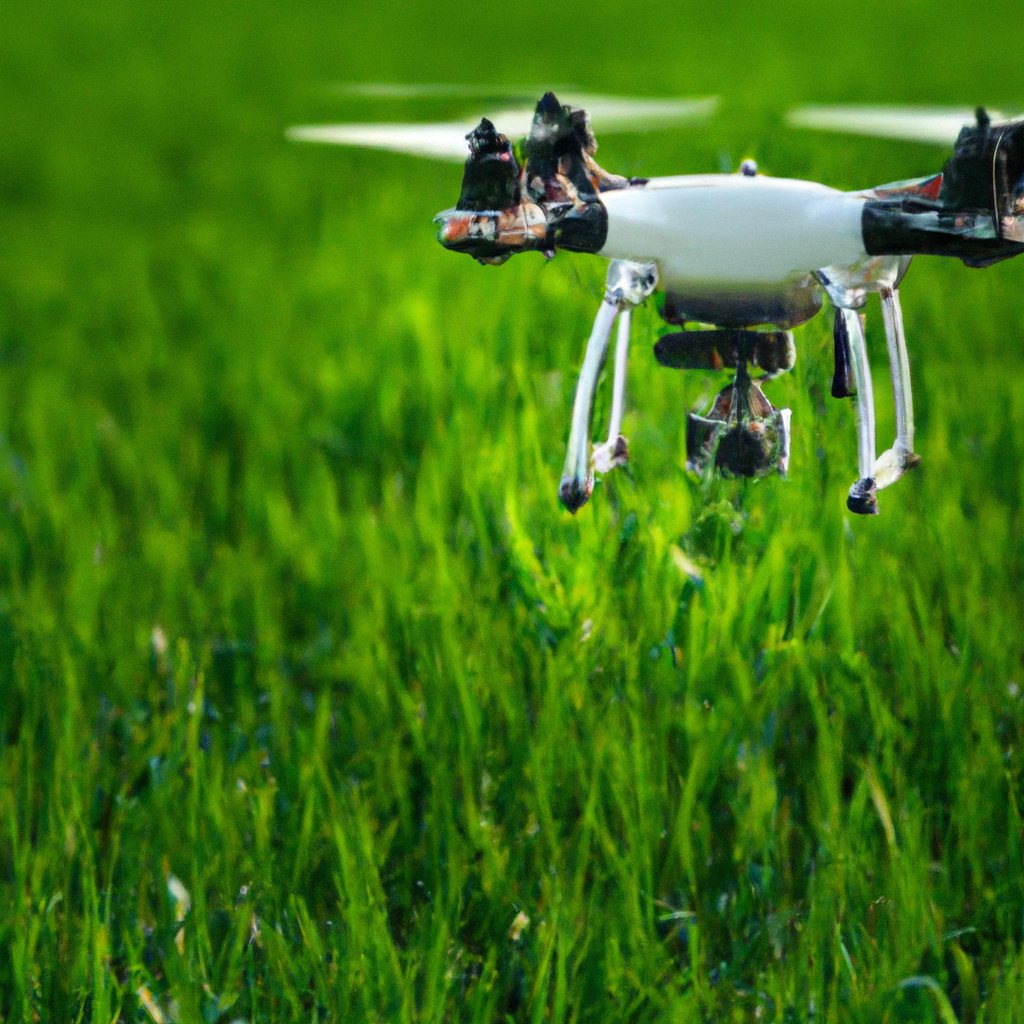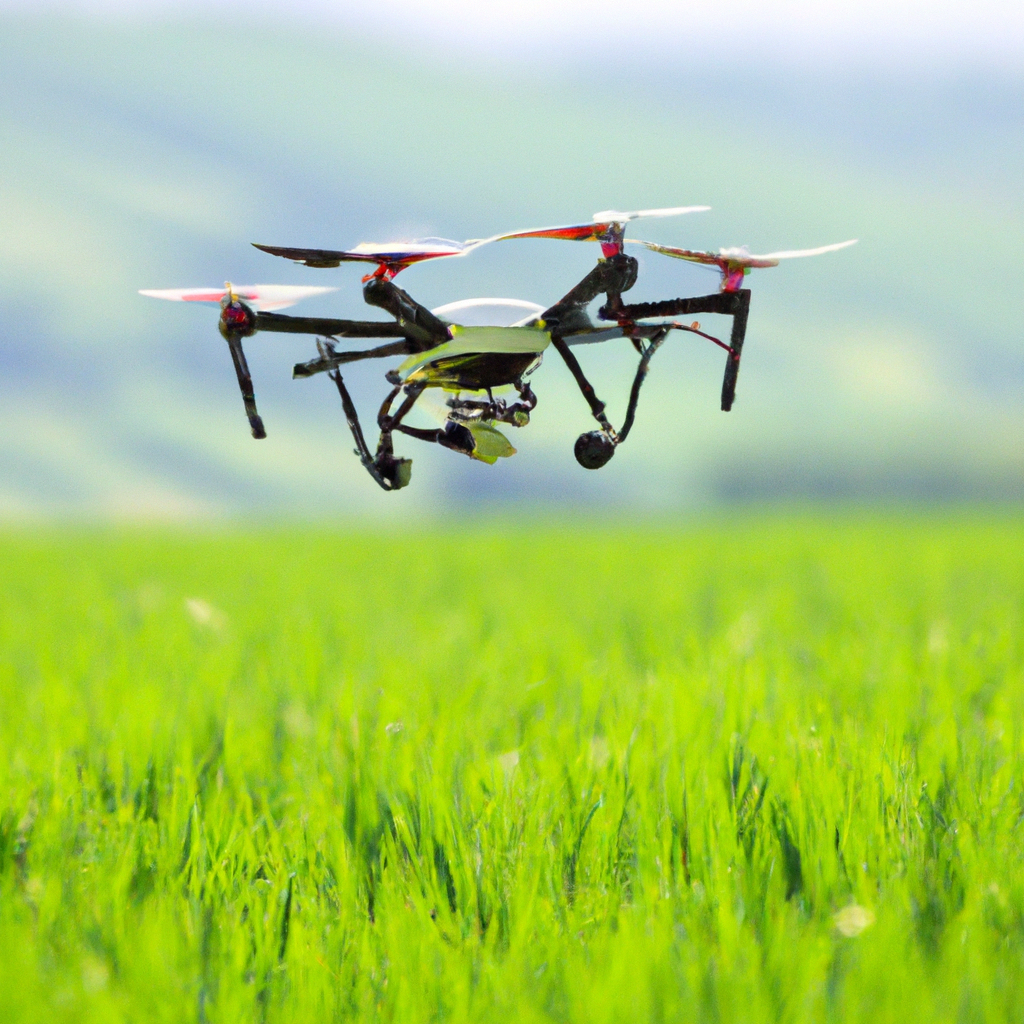In today’s world, where technology continues to revolutionize every industry, it’s no surprise that artificial intelligence (AI) has made its way into the field of precision agriculture. Harnessing the power of AI, farmers now have the ability to optimize crop yield, minimize resource wastage, and make data-driven decisions that maximize efficiency. With AI’s ability to analyze vast amounts of data, detect patterns, and provide valuable insights, it has become an indispensable tool in the quest for sustainable and intelligent farming practices. Let’s explore how AI contributes to precision agriculture and the benefits it brings to farmers worldwide.
Increased Efficiency
Autonomous Robots
Autonomous robots are revolutionizing the field of precision agriculture. With the help of artificial intelligence (AI), these robots can perform various tasks without human intervention. From sowing seeds to harvesting crops, these autonomous robots can carry out these activities with precision and efficiency. By reducing the need for manual labor, these robots can significantly increase the overall efficiency of agricultural operations. They can work tirelessly around the clock, ensuring that tasks are completed in a timely manner.
Automated Crop Monitoring
AI-powered automated crop monitoring systems enable farmers to keep a close eye on the health and growth of their crops. These systems utilize sensors and cameras to collect extensive data, which is then analyzed by AI algorithms. This data provides valuable insights into the crops’ growth rate, health conditions, and nutrient requirements. Farmers can receive real-time alerts and notifications about any issues or anomalies detected, such as pest outbreaks or nutrient deficiencies. With this information, farmers can take proactive measures to address these problems, leading to increased efficiency in crop management.
Precision Irrigation
One of the major challenges in agriculture is efficient water management. AI plays a crucial role in optimizing irrigation practices through precision agriculture. By leveraging weather data, soil moisture sensors, and AI algorithms, farmers can precisely determine the water requirements of their crops. This enables them to apply water in the right amount and at the right time, minimizing water wastage and maximizing crop productivity. In addition, AI can also help in predicting crop water demand, allowing farmers to plan irrigation schedules more effectively.
Predictive Analytics
With AI-based predictive analytics, farmers can make more informed decisions related to various aspects of farming. By analyzing historical data, weather patterns, and crop performance records, AI algorithms can generate accurate predictions about crop yield, market demand, and even future climate conditions. These predictions enable farmers to optimize their farming strategies, such as choosing the right crops to grow, determining planting dates, and managing resources accordingly. By leveraging predictive analytics, farmers can maximize their productivity and minimize potential risks.

This image is property of images.pexels.com.
Improved Decision Making
Crop Health Monitoring
Monitoring the health of crops is paramount for successful agricultural operations. AI helps in automating this process by analyzing data from sensors, drones, and satellite imagery. By detecting subtle changes in plant health, AI algorithms can identify diseases, nutrient deficiencies, and pest infestations at an early stage. Farmers can then take prompt actions to mitigate these problems, reducing crop loss and maintaining high productivity. By providing real-time insights into crop health, AI contributes to improved decision making in terms of pest control measures, disease management, and optimal use of fertilizers.
Pest and Disease Detection
Pest and disease outbreaks can cause significant damage to crops if not addressed in a timely manner. AI aids in early detection and prevention of such outbreaks through advanced image recognition techniques. By analyzing images of crops captured by drones or cameras, AI algorithms can identify specific pests or diseases and alert farmers to take appropriate measures. This proactive approach not only saves crops from damage but also minimizes the use of pesticides, promoting sustainable farming practices.
Yield Prediction
Accurate yield prediction is crucial for farmers to plan their harvesting, storage, and marketing strategies. AI-based yield prediction models utilize various data inputs such as historical yield data, weather conditions, soil moisture levels, and crop health information. By analyzing these inputs, AI algorithms can generate reliable predictions about the expected yield. This empowers farmers to make informed decisions regarding workforce planning, storage facilities, and pricing strategies, optimizing their operations and maximizing profitability.
Market Forecasting
The agricultural market is subject to various factors that can impact crop prices and demand. AI-based market forecasting models help farmers anticipate market trends and make strategic decisions regarding crop selection and pricing. By analyzing historical market data, weather patterns, and geopolitical factors, AI algorithms can predict future market conditions. This enables farmers to align their production with market demand, reducing the risk of oversupply or undersupply. By leveraging market forecasting, farmers can optimize their sales and marketing strategies, ultimately leading to improved decision making and profitability.

This image is property of images.pexels.com.
Optimized Resource Management
Soil Analysis
AI plays a crucial role in optimizing soil analysis, which is essential for understanding soil fertility and nutrient requirements. By analyzing soil samples and historical data, AI algorithms can provide farmers with valuable insights into the composition of their soil, including nutrient content, pH levels, and organic matter. Armed with this information, farmers can make informed decisions regarding fertilizer applications, ensuring that crops receive the necessary nutrients for healthy growth. By optimizing soil analysis through AI, farmers can maximize crop productivity while minimizing the use of excessive fertilizers, promoting sustainable farming practices.
Fertilizer and Nutrient Management
Efficient management of fertilizers and nutrients is essential for sustainable and productive agriculture. AI helps farmers determine the optimal application rates and timings for fertilizers based on soil conditions, crop requirements, and environmental factors. By analyzing data from soil sensors, weather forecasts, and crop health monitoring systems, AI algorithms can recommend precise fertilizer application strategies. This reduces the risk of nutrient imbalances, minimizes environmental pollution, and ensures that crops receive the necessary nutrients for optimal growth.
Weed Detection and Control
Weeds pose a significant challenge in agriculture, competing with crops for resources and reducing overall productivity. AI-powered systems can aid in early detection and control of weeds. By analyzing images of crop fields, AI algorithms can differentiate between crops and weeds, enabling farmers to take targeted weed control measures. With this technology, farmers can minimize the use of herbicides, reducing the environmental impact and promoting sustainable weed management practices.
Water Management
Efficient water management is crucial for sustainable agriculture, especially in regions facing water scarcity. AI technology helps optimize water usage through precise monitoring and control. By analyzing real-time data from soil moisture sensors, weather forecasts, and crop water requirements, AI algorithms can determine the optimal irrigation schedule and volume. This enables farmers to minimize water wastage, reduce irrigation costs, and conserve this precious resource. By leveraging AI for water management, farmers can ensure that crops receive adequate water while minimizing the impact on the environment.

This image is property of images.pexels.com.
Enhanced Crop Quality and Productivity
Seed Selection and Planting
Selecting the right seeds and optimizing the planting process are key factors in achieving high crop quality and productivity. AI helps in seed selection by analyzing various factors such as soil conditions, climate data, and historical crop performance. By considering these factors, AI algorithms can recommend the most suitable seed varieties for specific regions and conditions. Additionally, AI can optimize the planting process by analyzing planting patterns and factors such as spacing and depth. This ensures that crops are planted efficiently, maximizing germination rates and overall yield.
Crop Harvesting
AI-powered harvesting systems have revolutionized the agricultural industry by enabling automated and efficient crop harvesting. With advanced computer vision and robotic technologies, AI algorithms can identify and harvest ripe crops with precision and speed. This reduces the need for manual labor and increases overall harvesting efficiency. Automated harvesting systems equipped with AI technology can work tirelessly, harvest crops at optimal ripeness, and minimize post-harvest losses.
Crop Sorting and Grading
Sorting and grading crops is a labor-intensive process that requires accuracy and efficiency. AI-based computer vision technology can analyze the visual appearance and quality of crops, enabling automated sorting and grading. By using advanced image recognition algorithms, AI can categorize crops based on parameters such as size, color, and defects. This ensures consistent and accurate grading, leading to improved marketability and higher prices for farmers.
Quality Control
Maintaining crop quality is crucial to meet market demands and consumer expectations. AI plays a vital role in quality control by analyzing various factors such as crop appearance, size, and nutritional content. By automating quality control processes, AI algorithms can detect defects, diseases, or abnormalities in crops. This enables farmers to take appropriate actions, such as adjusting harvesting practices or implementing pest control measures, to ensure high-quality produce. With AI-powered quality control, farmers can deliver consistent and premium-quality crops to the market, enhancing their reputation and profitability.

Minimized Environmental Impact
Precision Application of Chemicals
AI contributes to minimizing the environmental impact of agricultural practices by enabling precision application of chemicals such as pesticides and fertilizers. By analyzing crop health data, weather conditions, and pest infestation patterns, AI algorithms can determine the precise amount of chemicals required and the optimal timing for application. This reduces the use of chemicals, minimizes environmental pollution, and promotes sustainable pest and disease management.
Reduced Soil Erosion and Pollution
Soil erosion is a significant environmental concern in agriculture, leading to the loss of topsoil and the degradation of land. AI helps address this issue by optimizing soil management practices. By analyzing soil data and weather patterns, AI algorithms can recommend erosion control measures, such as contour plowing or the use of cover crops. This minimizes soil erosion, preserves soil fertility, and promotes sustainable land management practices. Additionally, AI-driven precision agriculture practices can reduce pollution by minimizing runoff of chemicals into water bodies.
Biodiversity Conservation
AI contributes to biodiversity conservation by promoting sustainable agriculture practices. By optimizing resource management, AI helps reduce the use of chemicals, which can have adverse effects on ecosystems and biodiversity. AI-powered precision agriculture also enables farmers to adopt diverse crop rotations and intercropping practices, enhancing biodiversity within agricultural landscapes. By ensuring the coexistence of different species, AI contributes to the conservation of beneficial organisms, such as pollinators and natural predators, thus promoting sustainable and resilient ecosystems.
Efficient Energy Usage
AI-based precision agriculture practices help optimize energy usage in farming operations. By analyzing data such as weather patterns, energy demand, and machine performance, AI algorithms can recommend the most efficient use of energy resources. This can include scheduling farm activities based on energy availability, using energy-efficient machinery, and utilizing renewable energy sources. By optimizing energy usage, farmers can reduce their carbon footprint and contribute to a more sustainable agricultural sector.

Overcoming Agricultural Challenges
Climate Change Adaptation
Climate change poses significant challenges to agriculture, including increased temperature, changing rainfall patterns, and more frequent extreme weather events. AI contributes to climate change adaptation by providing valuable insights and predictions. By analyzing historical climate data, AI algorithms can help farmers understand the local impacts of climate change and make informed decisions regarding crop selection, irrigation strategies, and pest control measures. This empowers farmers to adapt their practices to changing climatic conditions, ensuring food security and sustainable agricultural production.
Labor Shortages
The agriculture sector often faces labor shortages, as fewer people are interested in pursuing careers in farming. AI-powered automation technologies help overcome this challenge by reducing the dependency on manual labor. Autonomous robots, drones, and AI-driven machinery can perform various tasks, such as planting, harvesting, and crop monitoring, without human intervention. By automating labor-intensive tasks, farmers can optimize their workforce and increase operational efficiency, even in the face of labor shortages.
Food Security
AI plays a crucial role in ensuring food security by maximizing crop productivity and minimizing losses. By providing real-time insights into crop health, pest outbreaks, and market demand, AI helps farmers make informed decisions that optimize production and reduce the risk of food shortages. Additionally, AI contributes to sustainable farming practices by minimizing the use of resources, such as water and chemicals. By adopting AI technologies, farmers can enhance their ability to meet the growing global demand for food in a sustainable and efficient manner.
Post-Harvest Losses
Post-harvest losses pose a significant challenge in agriculture, impacting food availability and economic sustainability. AI can assist in reducing post-harvest losses by enabling timely and accurate decision making. By analyzing data on factors such as temperature, humidity, and storage conditions, AI algorithms can provide recommendations for optimal post-harvest handling and storage techniques. This ensures that crops are stored under optimal conditions, minimizing spoilage, and maximizing the shelf life of produce. By leveraging AI for post-harvest management, farmers can reduce losses and improve profitability.
